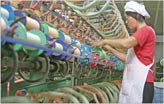Society
Lead poisons more than 600 people
Updated: 2011-06-13 08:52
(China Daily)
HANGZHOU - Local health authorities have discovered that more than 600 people, including 103 children, were suffering from lead poisoning in East China's Zhejiang province on Sunday.
Workers at 25 family-run workshops that process tinfoil in Yangxunqiao township in the province's Shaoxing county have dangerously high levels of lead in their blood, according to the results of a preliminary medical test.
Several of the workers' children also have high amounts of lead in their blood.
Test results showed that 26 adults and 103 children are suffering from severe lead poisoning, said a spokesman with the county's health bureau.
Adults are deemed to have severe lead poisoning if they have more than 600 micrograms of lead for every liter of their blood. For children, the amount is more than 250 micrograms for every liter of blood, said the spokesman.
The 129 victims of the poisoning are undergoing a second test, and 12 are receiving treatment at a local hospital, the spokesman said, adding that those confirmed to be suffering from severe lead poisoning will receive the treatment free of charge.
Another 494 people have been found to be suffering from moderate lead poisoning, meaning their bodies contain from 400 to 600 micrograms of lead for every liter of blood.
Lead is commonly used in the processing of tinfoil. Workers and their families, including children, are often exposed to lead in the family-run workshops in Yangxunqiao.
China has not adopted standards governing the use of lead in tinfoil processing.
Medical experts say that children often absorb more lead than adults and discharge it at a slower rate, tendencies which make their blood more likely to contain fatal amounts of the heavy metal.
Excessive amounts of lead in the blood can damage the digestive, nervous, and reproductive systems and cause stomachaches, anemia and convulsions. The township government said operations have been suspended at the 25 tinfoil workshops at which the lead poisoning originated.
The county's environmental bureau has sampled the water, air and soil in nearby places and found no evidence that they have been contaminated, according to the township government.
In Yangxunqiao, more than 2,500 people, mainly from Southwest China's Sichuan and Yunnan provinces, work at nearly 200 tinfoil-processing workshops.
Xinhua
(China Daily 06/13/2011 page2)
E-paper

Pearl on the Yangtze
Wuxi is considered a town of natural beauty and its motto is "city of water and warmth".
Prose and consternation
Riding on a mystery train
Way of a warrior
Specials

Wealth of difference
Rich coastal areas offer contrasting ways of dealing with country's development

Seal of approval
The dying tradition of seal engraving has now become a UNIVERSITY major

Making perfect horse sense
Riding horses to work may be the clean, green answer to frustrated car owners in traffic-trapped cities
